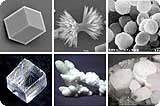séminaire – mercredi 17 décembre 2008
 Sulfated macromolecules and biomineralization
Sulfated macromolecules and biomineralization
José-Luis Arias, Centre for Advanced Interdisciplinary Research in Materials (CIMAT), faculté des sciences animales et vétérinaires de l’université du Chili à Santiago
mercredi 17 décembre 2008, à 11 heures, dans l’amphithéâtre Monge, bâtiment Gabriel
Calcium carbonate-based minerals are geologically formed in three main polymorphs, vaterite, aragonite and calcite. In the laboratory, it is possible to obtain such polymorphs by controlling kinetics and thermodynamics of the reaction, but only transitorily, because less thermodynamically stable polymorphs, such as vaterite and aragonite, do not last very long and spontaneously are transformed to calcite.
Biomineralization is a widespread phenomenon in nature leading to the formation of a variety of biominerals by living organisms. These biominerals are inorganic-organic hybrid composites formed by self-assembled bottom up processes under mild conditions, showing interesting properties and controlled hierarchical structures. In biominerals, the small amount of organic component not only reinforces the mechanical properties of the resulting composite but also exerts a crucial control on the mineralization process, contributing to the determination of the size, crystal morphology and polymorph stabilization, specific crystallographic orientation, and superb properties of the particles formed. Therefore, the formation of biominerals provides a unique guide for the design of materials, especially those that need to be fabricated at ambient temperatures.
In this seminar, especial features of the role of sulfated molecules on biomineralization will be reviewed.
- kc_data:
- a:8:{i:0;s:0:"";s:4:"mode";s:0:"";s:3:"css";s:0:"";s:9:"max_width";s:0:"";s:7:"classes";s:0:"";s:9:"thumbnail";s:0:"";s:9:"collapsed";s:0:"";s:9:"optimized";s:0:"";}
- kc_raw_content:
 Sulfated macromolecules and biomineralization
Sulfated macromolecules and biomineralizationJosé-Luis Arias, Centre for Advanced Interdisciplinary Research in Materials (CIMAT), faculté des sciences animales et vétérinaires de l'université du Chili à Santiago
mercredi 17 décembre 2008, à 11 heures, dans l'amphithéâtre Monge, bâtiment Gabriel
Calcium carbonate-based minerals are geologically formed in three main polymorphs, vaterite, aragonite and calcite. In the laboratory, it is possible to obtain such polymorphs by controlling kinetics and thermodynamics of the reaction, but only transitorily, because less thermodynamically stable polymorphs, such as vaterite and aragonite, do not last very long and spontaneously are transformed to calcite.
Biomineralization is a widespread phenomenon in nature leading to the formation of a variety of biominerals by living organisms. These biominerals are inorganic-organic hybrid composites formed by self-assembled bottom up processes under mild conditions, showing interesting properties and controlled hierarchical structures. In biominerals, the small amount of organic component not only reinforces the mechanical properties of the resulting composite but also exerts a crucial control on the mineralization process, contributing to the determination of the size, crystal morphology and polymorph stabilization, specific crystallographic orientation, and superb properties of the particles formed. Therefore, the formation of biominerals provides a unique guide for the design of materials, especially those that need to be fabricated at ambient temperatures.
In this seminar, especial features of the role of sulfated molecules on biomineralization will be reviewed.- extrait:
- lien_externe:
- titre:
- Sulfated macromolecules and biomineralization
- intervenant:
- José-Luis Arias
- date:
- mercredi 17 décembre 2008
